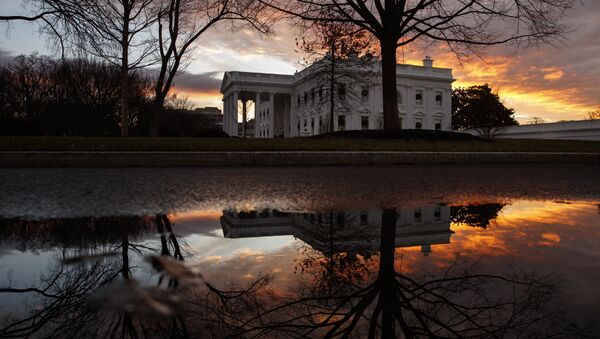On Monday, the US government shutdown entered day 24, two days longer than the previous record, without an agreement on a spending bill. President Donald Trump has requested and the Democrats have refused to approve more than $5 billion for the construction of a wall on the southern border.
Shutdown Benefits
Friday also marked the first missed paycheck for more than 800,000 federal government workers, about half of whom have worked without pay since the shutdown began 22 December, with the remainder sent home.
Wall Street analyst Charles Ortel told Sputnik on Monday said despite this Trump is correct to dig in and should fight more aggressively to demand Congress adopt budgets that run federal government's finances the way responsible families manage their annual incomes and balance sheets.
"Rather than worrying about some, potentially significant delays in processing certain applications/requests, one might better wonder how an indebted, deficit-wracked government could, in 2019, have 800,000 nonessential workers", Ortel observed.
Independent Institute Center for Peace and Freedom Director Ivan Eland told Sputnik that temporarily suspending most of the functions carried out by the part of the government now shut down was doing little harm and long term may even prove beneficial.
"As for the federal subsidies through federal backing of home and small business loans being frozen, the economy will be mildly affected adversely in the short-term, but might be better off in the long term, because distortion of the free market for both might be reduced", Eland said.
READ MORE: Trump Furious Over Dems 'Having Fun' Amid Government Shutdown
The economic effects of the shutdown of 20 percent of the government have probably been overstated, Eland suggested.
Federal Reserve Chairman Jerome Powell said in a speech at the Economic Club last week that a longer government shutdown would certainly harm the US economy and growth projections.
Risks
The shutdown so far has cost the US economy around $3.6 billion, Standard & Poor’s Chief US Economist Beth Ann Bovino said in a statement on Friday. The S&P estimate indicates that a shutdown lasting for two more weeks would cost the economy $6 billion, exceeding the $5.7 billion sought by Trump for his wall.
Retired Brown University Assistant Professor of Economics Barry Friedman told Sputnik that the longer the shutdown continued the greater was the risk that the long term credit rating of the federal government would be adversely affected, locking in damaging higher interest rates for all.
"If the impasse continues, an additional impact could come from a downgrade of government credit rating as the deadline to raise the debt ceiling will again come up in a couple months. This can raise interest rates for everyone", Friedman said.
"We're waiting to see if companies and larger investors, here and worldwide, will react with a ‘flight to safety’ that puts an impact on employment and can push us into a recession as a cumulative impact", he said.
Even the most sophisticated calculation of a return to fiscal stability and predictability could be wrecked by the erosion of business confidence, Friedman advised.
READ MORE: ‘Nobody is Winning’: Trump Gov’t Shutdown Now Longest Ever in US
"Most predictions of this sort have poor timing, and the more clever and urgent the prediction, the more likely to be wrong because big players do hedge against near term known risks", he said.
Ortel agreed that increasingly volatile swings in the US stock market were a warning sign that these fears were growing among investors.
"Volatile trading conditions in US bond and stock markets are signaling profound and reasonable concerns that the Trump Administration, the Congress and our Judiciary must get our nation's government finances back under true control", Ortel said.
Eland added that Trump’s devotion to re-imposing import tariffs and barriers to free trade was also backfiring and coming back to haunt him.
"In the short-term, delays on exemption for steel and aluminum import tariffs can hurt some businesses. But of course, Americans should really blame the imposition of unneeded tariffs from an unnecessary trade war in the first place", Eland pointed out.
The US president has hinted that he could declare a national emergency in order to secure funds to build a wall along the border with Mexico, though he has said he would prefer to reach a deal with Congress to do so.



